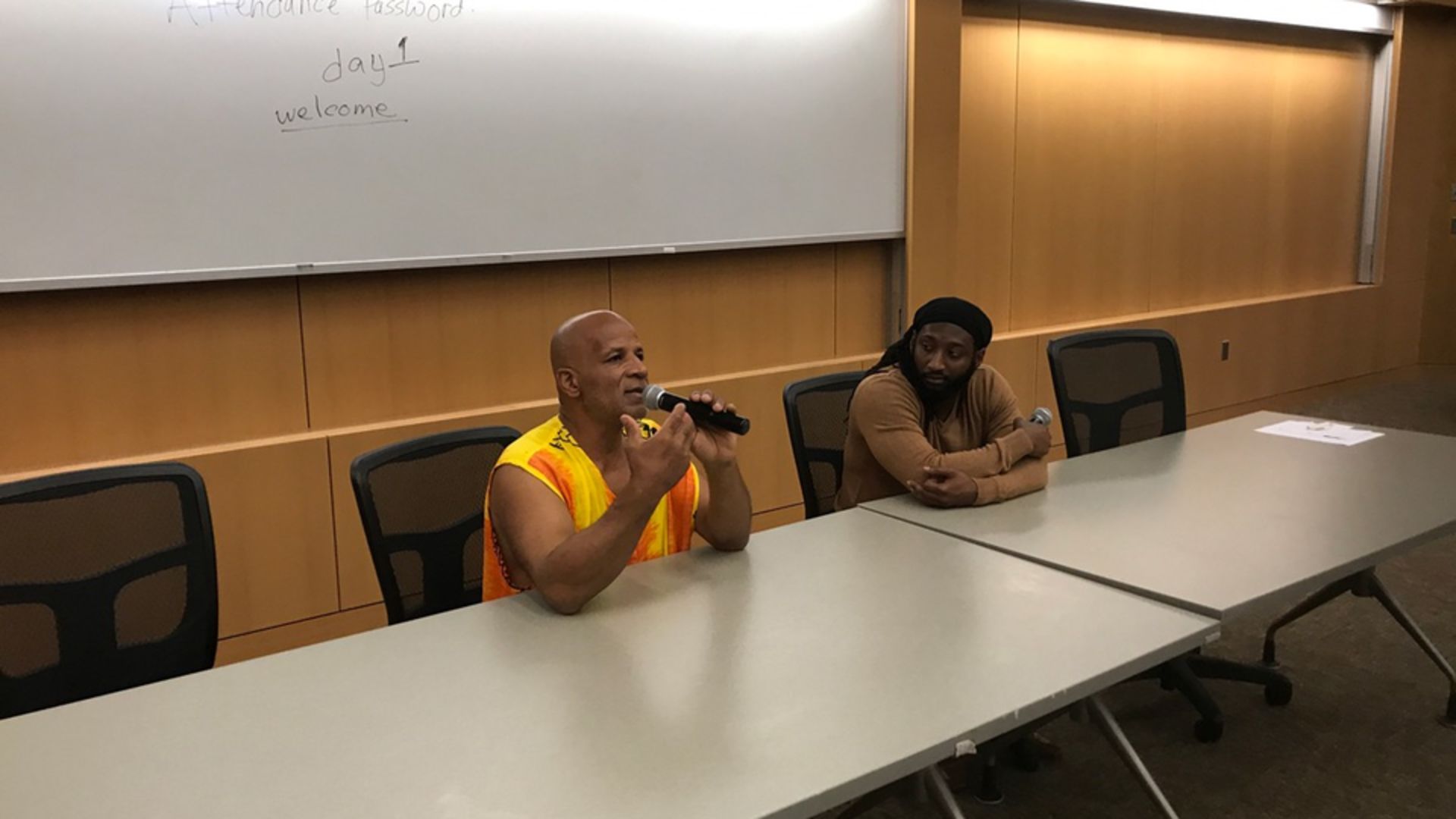Don’t be a savior, just be a doctor, and listen!
Advice to med students from patients in North Philly

Darien P. Ebo, left, and Matthew Simmons, patients of Dr. David O’Gurek, share with third year LKSOM students their advice on how to care for impoverished patients.
Don’t try to save the community, don’t burn yourselves out, just accept them as people, give them the dignity they so rarely get — this was the advice from two North Philadelphia patients to third year medical students.
Dr. David O’Gurek, an associate professor of family medicine, invited two of his patients to address the students recently on the issue of poverty. The goal was to give students a better understanding of the patients they treat and community they serve at Temple University Hospital.
One of the patients, Darien P. Ebo, said students might be amazed at the trash on the streets, and how people litter when there’s a trash can right there. “You could say that some people in the neighborhood don’t care about the neighborhood and it would be right,” said Ebo, a retired state corrections and transportation employee of 33 years who lives six blocks from the Hospital.
“But you’ve got to understand,” Ebo added, “that you’re talking about people who have been exposed to and ingrained with the idea that their reality means nothing. Literally, where they live and who they are is of little importance. And this is something they grow up with as children…
“It can go as far as being bankrupt in terms of what your life means,” he added.
He noted that when society places so little value on your community, you can’t help but place so little value on yourself. And the challenge is to find your own identity and self-worth.
One medical student, noting that he and so many of his peers come from much different backgrounds, asked for “advice on ways to join in or work with the community in a way that doesn’t seem artificial or paternalistic.”
“Honestly, you just got to be genuine,” Ebo said. “If you see people out there that are trying to dig and plant a garden, go out there and help. You want to talk to people, talk to people. Just don’t be scared. Don’t be phony. Just live life. Those opportunities and situations to get closer to the area, they’ll manifest themselves naturally.”
Matthew Simmons, another patient, told the students, “Don’t look at North Philadelphia as a population that needs to be saved by you all. You are in concert and communication with them. You’re not here to save them.”
Simmons works as a behavioral health specialist for Philadelphia schools and is working on a Ph.D in Africology and Africana Studies at Temple. His advice was to listen to patients, acknowledge them. “I felt I was just a number,” he said, before meeting O’Gurek. “Make people feel comfortable. It takes time to build relationships.”
And often, he added, “you don’t have to do the biggest things, but the littlest things may be more important.”
Another student said she had been full of empathy and compassion, but that her attendings had warned her against being too empathetic and passionate, that she would burn herself out.
The two patients said this was sound advice, and to find the balance.
“You can’t keep pouring out of your cup and expect to have something for yourself when your cup is empty,” said Simmons.
Ebo said he worked in prisons for 15 years, much of that time with young people. “I can’t adopt them,” he said. “I have children of my own. I like to be able to help them, but I can’t do it all. You have to find a way to be proactive, and to protect yourself. You kind of give it back to them. You help them be more proactive and help themselves.”
Both men said they love North Philadelphia, and felt it was important for the future physicians to understand this.
“I love it because it doesn’t lie to you,” said Ebo.
Simmons said he loved the resilience of the community.
“We make something out of nothing,” he said.
• • •
Michael Vitez, winner of the 1997 Pulitzer Prize for Explanatory Journalism at The Philadelphia Inquirer, is the director of narrative medicine at the Lewis Katz School of Medicine at Temple University. Michael.vitez@temple.edu
